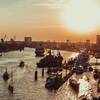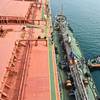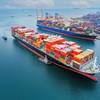Interferry Conference to Address Emissions
Interferry’s annual conference in October is well timed to help shape maritime policy at the next world summit on climate change, according to special guest speaker Peter Hinchliffe, secretary general of the International Chamber of Shipping.
ICS associate member Interferry stages its 35th anniversary event in New York City from October 3-6 – immediately after the 61st session of the IMO’s Marine Environment Protection Committee (MEPC 61) in London and just weeks ahead of this year’s meeting on the UN Framework Convention on Climate Change (UNFCCC) in Cancun, Mexico.
As leader of the influential ICS delegation at both assemblies, Hinchliffe will be on a dual mission when he addresses the ferry trade association on emerging regulations - notably far reaching measures to reduce CO2 emissions – and their impact on shipping operations and planning.
“Firstly, this is an important opportunity to tell Interferry members what happened at MEPC 61 in setting a baseline for how the industry at large moves forward and where to focus on the political front,” he said.
“Secondly, the really great advantage of the conference timing is that we can develop this to determine the position of the ferry sector in advance of Mexico. I am hoping for some serious dialogue with delegates as part of an industry-wide process. The international industry needs to reflect on where it sits after MEPC 61 and build on whatever is decided there so that we can report effectively to the UNFCCC and future IMO meetings.”
Hinchliffe said MEPC 61 would “probably” endorse legislative text on the Energy Efficiency Design Index (EEDI) – designed to cut greenhouse gas emissions – for standard-propulsion oceangoing ships, but noted that the intersessional working group meeting in July had acknowledged shortcomings in the proposals for non-standard ships such as ferries.
This followed lobbying by the ICS, Interferry and other bodies at MEPC 60 in March – resulting in a further two years being allowed to develop a solution tailored to the specific power arrangements required in short sea ro-pax and ro-ro operations.
Interferry, representing 220 member companies in 33 countries, has also used its IMO consultative status to lobby the MEPC on the impact of requirements to use low sulphur fuel in emission control areas (ECAs).
The ICS is leading further argument on the subject in a submission to MEPC 61 on the North Sea and Baltic Sea ECAs, where sulphur limits were lowered from 1.5% to 1.0% from July 1 this year and are due to be reduced to 0.1% by 2015.
The paper quotes estimates by environmental consultancy ENTEC that the additional cost of switching to 0.1% would average $306 per tonne, representing an 80% increase in overall fuel costs. Shipowners are reported as suggesting that the effect on freight rates will prompt an environmentally harmful modal shift to road and rail by up to 50% of their customers.
Hinchliffe’s update to an expected 250 Interferry delegates will introduce a major conference session on environmental innovations. This includes a feasibility study on emissions-free ferries by Netherlands operator Royal Wagenborg; a review of scrubber technology by the Exhaust Gas Systems Cleaning Association; and concepts for flexible ferry design from Wartsila and Deltamarin.
Other sessions under the event theme of “navigating through a new world economy” include emergency preparedness, raising finance, emerging markets and the commercial value of interior design.












